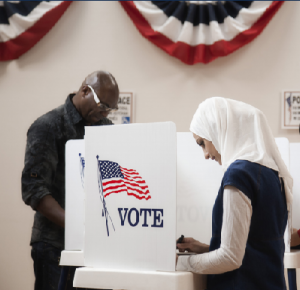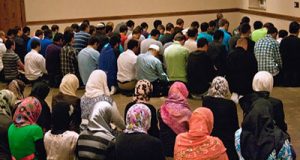In the years after the September 11th attacks in America, Muslims have been the subjects of frequent discussions but seldom among the participants. The lack of American Muslim voices in the national discourse makes much of the discussion of the community speculative or worse.

Muslims have a strong American identity. They are also as likely as other Americans to identify strongly with their faith.
These combined factors work to create a climate in which the majority of Muslims report some level of discrimination—the highest of any major faith group. This survey examines the attitudes of American faith groups on various topics from politics and religion, to violence and identity.
What emerges is the profile of an American Muslim community that is both pious and patriotic, optimistic and weary of discrimination, similar to Jews in its politics, and much like Protestants in its religious practice.
In early 2016, the Institute for Social Policy and Understanding conducted a survey of American Muslims, Jews, Protestants, and Catholics to examine their attitudes on various issues from politics and religion, to violence and identity.
What emerged from the results is a profile of a American Muslim community that is both pious and patriotic, optimistic and weary of discrimination, similar to Jews in its politics, and much like Protestants in its religious practice.
Muslims are ethnically diverse; the majority favor Democrats
Muslims are the youngest and most racially diverse major religious community in America—the only community without a majority race. Within the Muslim population is a nearly equal percentage of four different racial/ethnic subgroups: white, black, Asian, and Arab.
Muslims are also by far the youngest faith community, with 36 percent of the population younger than 35 compared with roughly one-quarter of Protestants, for example.
Muslims: Economy, Islamophobia are top priorities for next President
Muslims, like other American faith groups, see the economy as a top priority for the next president. The most striking difference in priorities is, however, that Muslims are the only faith group to identify bigotry and civil rights as a priority (9 percent).
American Muslim reports more religious discrimination than any other group
More than half of Muslims reported facing some level of discrimination in the past year because of their religion, with 18 percent reporting regular discrimination, the highest of any group.
Those who report regular discrimination were less likely to be optimistic about the country, but more likely to engage in community activities. This suggests that the American Muslim responds to discrimination by becoming more proactive and involved rather than more isolated.
Muslims are equally engaged in community, less politically
Muslims are least likely to be politically engaged. Whereas 85 percent of Muslims who can legally vote say they plan on casting their ballot for the next president, only 60 percent are actually registered compared with at least 86 percent of Jews, Catholics, and Protestants.
This means that a full one-fourth of Muslims who can legally vote and say they plan to vote still have not registered, resulting in the largest gap between the intention to participate and the readiness to do so. Roughly 15 percent of Muslims who are able to vote for the next president say they do not plan to—the largest of any faith group.

Muslims who regularly attend mosques are more likely to work with their neighbors to solve community problems, be registered to vote, plan to vote.
Muslims are as likely (statistically) as other religious groups, however, to cooperate with people in their neighborhoods to solve problems. This suggests that those who aim to increase Muslim political engagement would do well to start at the local level.
Mosque attendance is linked to civic engagement, not radicalization
American mosques made headlines when front-runner Republican candidate Donald Trump suggested that they be closed because they allegedly cause radicalization.
We found that frequent mosque attendance has no correlation with attitudes toward violence against civilians, but it is linked with higher levels of civic engagement.
Muslims who regularly attend mosques are more likely to work with their neighbors to solve community problems, be registered to vote, and are more likely to plan to vote.
Stronger Muslim religious identity is linked to stronger American identity
Despite lower political engagement, Muslims have a strong American identity. They are also as likely as other Americans to identify strongly with their faith.
Although a recent poll shows that a slight majority of Americans say they do not believe Islam is compatible with American values, the data paint a different picture.
Muslims who say their faith is important to their identity are more likely to say being American is important to how they think of themselves.
Muslims reject attacks on civilians
Muslims oppose military targeting and killing of civilians more than any other faith group, and are as likely as other faith groups to also oppose the same act of violence carried out by individuals or a small group.
Muslims who attend religious services more frequently or have a stronger religious identity do not differ in their views of civilian casualties by either a military or an individual from those who do not hold strong religious views.
_________________________
Source: www.ispu.org
 Arabic
Arabic English
English Spanish
Spanish Russian
Russian Romanian
Romanian Hindi
Hindi Tagalog
Tagalog Bengali
Bengali Sinhalese
Sinhalese Nepali
Nepali

